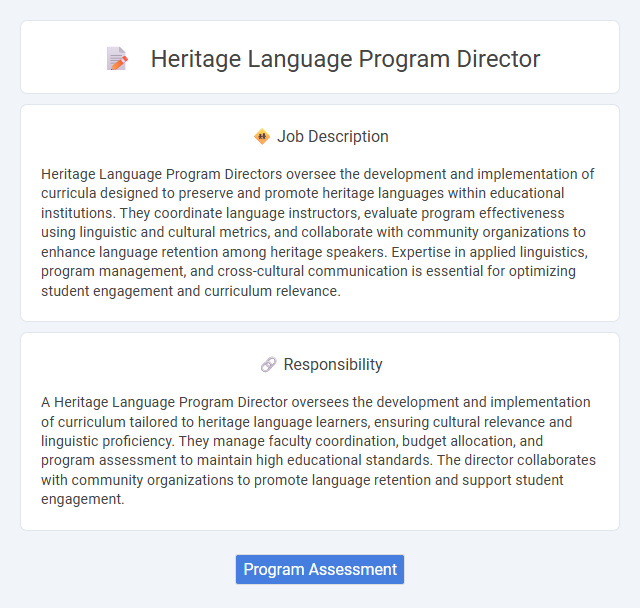
Heritage Language Program Directors oversee the development and implementation of curricula designed to preserve and promote heritage languages within educational institutions. They coordinate language instructors, evaluate program effectiveness using linguistic and cultural metrics, and collaborate with community organizations to enhance language retention among heritage speakers. Expertise in applied linguistics, program management, and cross-cultural communication is essential for optimizing student engagement and curriculum relevance.
Individuals with strong cross-cultural communication skills and a passion for preserving linguistic diversity are likely suitable for the Heritage Language Program Director role. Candidates who thrive in collaborative environments and possess experience in educational program management may have a higher probability of success. Those with little interest in community engagement or limited knowledge of heritage languages might find this position less compatible with their strengths.
Qualification
A Heritage Language Program Director should possess a master's degree or higher in linguistics, education, or a related field, with specialized knowledge in heritage language acquisition and curriculum development. Proven experience in educational program management, including staff supervision and budget oversight, is essential for effective leadership. Strong skills in community engagement and proficiency in the target heritage languages are critical for fostering authentic language learning environments.
Responsibility
A Heritage Language Program Director oversees the development and implementation of curriculum tailored to heritage language learners, ensuring cultural relevance and linguistic proficiency. They manage faculty coordination, budget allocation, and program assessment to maintain high educational standards. The director collaborates with community organizations to promote language retention and support student engagement.
Benefit
The Heritage Language Program Director position likely offers significant benefits such as enhancing linguistic diversity and supporting cultural preservation within educational institutions. This role may provide opportunities for professional growth by leading innovative language initiatives and collaborating with multicultural communities. Increased visibility and impact in shaping curriculum development for heritage languages could also be expected.
Challenge
Managing the Heritage Language Program Director position likely involves addressing the challenge of balancing curriculum development with diverse student needs. It probably requires navigating resource constraints while fostering community engagement to preserve cultural identity. Finding effective strategies to motivate both teachers and students in a multilingual context is also potentially demanding.
Career Advancement
Heritage Language Program Directors oversee curriculum development and faculty recruitment to promote bilingual education, fostering cultural preservation through language programs. Expertise in linguistics, education administration, and community engagement enhances opportunities for leadership roles in academic institutions and language advocacy organizations. Career advancement often leads to senior administrative positions, policy-making roles, and influential partnerships with educational and cultural entities.
Key Terms
Program Assessment
The Heritage Language Program Director oversees comprehensive program assessment to ensure curriculum effectiveness and learner progress in maintaining heritage languages. They implement data-driven evaluation methods, including standardized testing, student feedback, and proficiency benchmarks, to identify strengths and areas for improvement. Continuous program refinement is guided by assessment results to enhance cultural relevance, instructional quality, and language retention outcomes.
 kuljobs.com
kuljobs.com